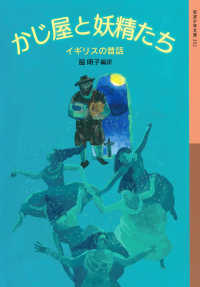- ホーム
- > 洋書
- > ドイツ書
- > Humanities, Arts & Music
- > Linguistics
- > romanic linguistics
Full Description
Reading is a peculiar kind of experience. Although its practice and theory have a very long tradition, the question of aesthetic pleasure is as perplexing as ever. Why do we read? What exactly thrills us in the text? One of the most prominent scholars having addressed these questions in the twentieth century is undeniably Roland Barthes, who distinguished between the «ordinary» pleasure of reading and bliss (jouissance), a delight so profound that it cannot be expressed in words. Taking his work as a central reference, and revisiting some of his seminal publications on the subject such as Empire of Signs (1970) and The Pleasure of the Text (1973), this collection of essays adopts a similar interdisciplinary approach to explore a broad range of themes and issues related to the notion of readerly enjoyment, between form and content, emotion and reason, and escapist and knowledge-seeking responses to the text: how do literary and ideological pleasures intersect? In what ways do perversions, madness or even fatigue contribute to the pleasure of the text? How do writing and signs, sense and significance, but also image and text interact in the intermedial process of reading? How can paratexts - i.e. the margins of the text, including footnotes - and metatexts play a part in the reader's enjoyment?
Contents
Contents: Perversity, Madness and Projective Reading, at the Margins of the Text: Image and Paratext in Barthes - Alex Watson: The Perverse Footnote: Roland Barthes's The Pleasure of the Text and the Politics of Paratextuality - Patrick ffrench: To Enter Madly into the Image: Reading Projectively in Barthes - On Pleasure, Fatigue and Death in/of the Text: Textual Exhaustion and Oscillations - Kohei Kuwada: Pleasure and Fatigue of the Barthesian Text - Fuhito Endo: Genealogy of Textual Necrophilia or Death Drive: Barthes, Freud, De Man, and Mehlman - Krista Bonello Rutter Giappone: Tragicomic Pleasure and Tickling-Teasing Oscillation in John Marston's Antonio Plays - Barthes and Japan, the «Empire of Signs»: Signifiance and Undialectical Writing - Fabien Arribert-Narce: Taking Signs for What They Are: Roland Barthes, Chris Marker and the Pleasure of Texte Japon - Andy Stafford: The Barthesian «Double Grasp»: Reading as Undialectical Writing.






